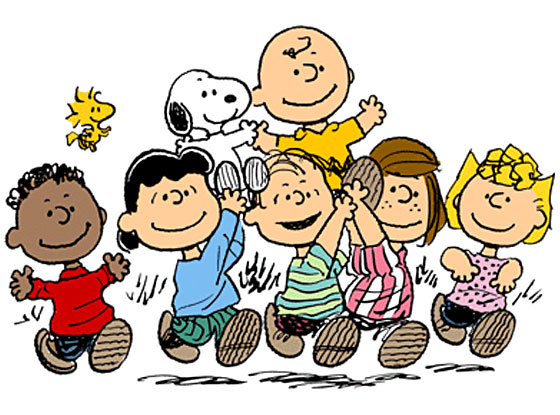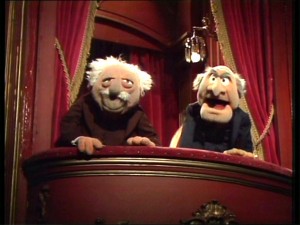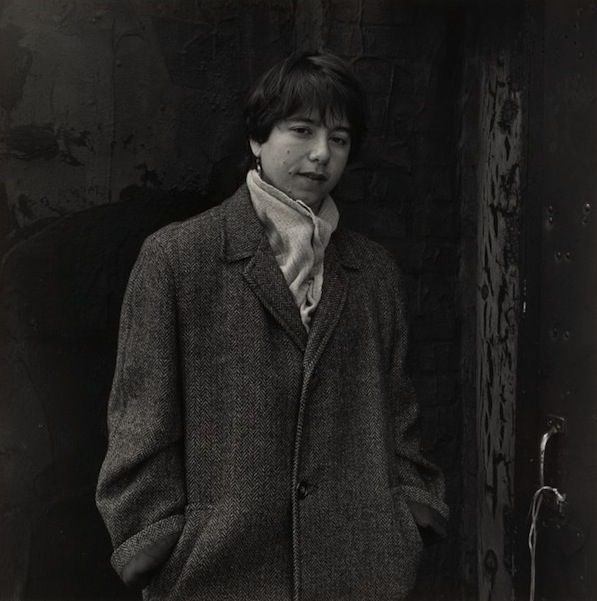Make no mistake: I unabashedly adore awards shows. It’s not that I think the Oscars or the Golden Globes or, dare I say it, the Indie Spirits are the ideal arbiter of what’s best or worthy. I’m well aware that such ceremonies are all about preexisting allegiances and behind-the-scenes wheeling-and-dealings, with an occasional infusion of pure magic. Which is to say: they’re politics as usual, albeit with less blood on the stake than you’d find in D.C. and far more delightful eveningwear. My jam, in other words. Maybe that’s why I am incapable of shutting up on this subject, despite the fact that I’m never particularly invested in actual award show outcomes. To wit: over at indieWire, I select my 2012 besties. ON WOMR, Cape Cod’s Pacifica radio station, I hold forth about Oscar-nominated films on Ira Wood’s show The Lowdown. And on Talking Pictures, the weekly TV show hosted by Neil Rosen, I sound off on my Oscar predictions like nobody’s business. (The link only works if you can get behind the pay wall; apologies if you cannot.)
But at the end of the day, no matter how many ceremonies take place, I always think the real accolades have yet to be awarded. To that end I’ve compiled my own set of awards, despite the fact that it’s all, like, total hierarchical bullshit, man. So with no further fanfare save a metaphorical floor-length velvet gown and shiny, shiny Cinderella slippers, I present to you My Dubious Honors…
Best Horror Movie: Amour
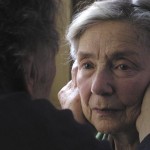 Though I review an awful lot of them for Talking Pictures, I loathe horror movies. Typically I dig about one per decade–Rosemary’s Baby, The Shining, The Exorcist–and it’s almost always for their outstanding visual style rather than for their suspense and splatters. On this topic as on so many others, Eddie Murphy said it best on his Delirious album: “In the Amityville Horror the ghost told them to get out of the house. Now that’s a hint and a half for your ass. A ghost says get the fuck out. White people stayed in there. I would just tiptoe the fuck out the door!” I regard this genre much as I regard roller coasters or sky diving: a delivery system of artificially high stakes for people who are too cushioned, dissociated or just plain stupid to register the terrors of real life. Which may be why I love Amour so, so much. Its director, Michael Haneke, helms the kind of misanthropic scary movies I dislike most (Funny Games and The Piano Teacher) but it’s that focus on the monstrousness lurking in ordinary people that renders him an ideal candidate to address the scariest story of them all: aging. A brilliantly made film, with heartbreakingly specific performances from Emmanuelle Riva and Jean-Louis Trintignant.
Though I review an awful lot of them for Talking Pictures, I loathe horror movies. Typically I dig about one per decade–Rosemary’s Baby, The Shining, The Exorcist–and it’s almost always for their outstanding visual style rather than for their suspense and splatters. On this topic as on so many others, Eddie Murphy said it best on his Delirious album: “In the Amityville Horror the ghost told them to get out of the house. Now that’s a hint and a half for your ass. A ghost says get the fuck out. White people stayed in there. I would just tiptoe the fuck out the door!” I regard this genre much as I regard roller coasters or sky diving: a delivery system of artificially high stakes for people who are too cushioned, dissociated or just plain stupid to register the terrors of real life. Which may be why I love Amour so, so much. Its director, Michael Haneke, helms the kind of misanthropic scary movies I dislike most (Funny Games and The Piano Teacher) but it’s that focus on the monstrousness lurking in ordinary people that renders him an ideal candidate to address the scariest story of them all: aging. A brilliantly made film, with heartbreakingly specific performances from Emmanuelle Riva and Jean-Louis Trintignant.
The Nicolas Cage Lifetime Achievement Award for Making Bad Actors Seem Like Good Actors: Quentin Tarantino
 More than anybody working today, Nicolas Cage has made a career of passing off his self-conscious acting as meaningful and method-y rather than overly mannered trash. Hence this award, which has been established in his honor (and endowed by the IRS, which has fished many a dollar out of his pocket over the last few years). Let the record show that there’s no more apt recipient than Tarantino. Sure, Soderbergh has given him a run for his money but that director’s announced retirement seems an honorable response to his demonstrated ambivalence about moviemaking. QT has myriad flaws, not least of which is that that he persists in tackling big-kid subjects like history and gender politics though his body of knowledge seems limited to B movies. But when it comes to coaxing stellar performances out of mediocre, often long-forgotten actors, the brother reigns supreme. See: Uma Thurman, Bruce Willis, Pam Grier (I love her but the lady cannot act), and, most recently, Don Johnson, John Travolta, Bridget Fonda, and Leonardo DiCaprio. Yep, I went there. And speaking of “yep, I went there”….
More than anybody working today, Nicolas Cage has made a career of passing off his self-conscious acting as meaningful and method-y rather than overly mannered trash. Hence this award, which has been established in his honor (and endowed by the IRS, which has fished many a dollar out of his pocket over the last few years). Let the record show that there’s no more apt recipient than Tarantino. Sure, Soderbergh has given him a run for his money but that director’s announced retirement seems an honorable response to his demonstrated ambivalence about moviemaking. QT has myriad flaws, not least of which is that that he persists in tackling big-kid subjects like history and gender politics though his body of knowledge seems limited to B movies. But when it comes to coaxing stellar performances out of mediocre, often long-forgotten actors, the brother reigns supreme. See: Uma Thurman, Bruce Willis, Pam Grier (I love her but the lady cannot act), and, most recently, Don Johnson, John Travolta, Bridget Fonda, and Leonardo DiCaprio. Yep, I went there. And speaking of “yep, I went there”….
The Crap Feminist Award: Tina Fey
 It’s not that Fey isn’t brilliant and it’s not that she isn’t a very, very sharp writer and it’s not that 30 Rock hasn’t had a terrific, if markedly two-dimensional, run and it’s not that I didn’t absolutely adore her co-hosting gig on the Golden Globes. But bottom line is she’s a very funny woman who tends to deride other women, especially single ones who don’t have kids, in nearly every project she writes. And lest anyone chalk this tendency up to simple self-loathing, may I remind the court that she herself has been married for decades and even has two baby bossypants? At the end of the day, Fey herself is a bit of a mean girl and a daddy’s approval junkie, albeit one who is so wonderfully clever, and so wonderfully conflicted, that I don’t begrudge her even as she sends up “my kind.” Just don’t herald her as a feminist.
It’s not that Fey isn’t brilliant and it’s not that she isn’t a very, very sharp writer and it’s not that 30 Rock hasn’t had a terrific, if markedly two-dimensional, run and it’s not that I didn’t absolutely adore her co-hosting gig on the Golden Globes. But bottom line is she’s a very funny woman who tends to deride other women, especially single ones who don’t have kids, in nearly every project she writes. And lest anyone chalk this tendency up to simple self-loathing, may I remind the court that she herself has been married for decades and even has two baby bossypants? At the end of the day, Fey herself is a bit of a mean girl and a daddy’s approval junkie, albeit one who is so wonderfully clever, and so wonderfully conflicted, that I don’t begrudge her even as she sends up “my kind.” Just don’t herald her as a feminist.
The Hairy-Armpits, Burning-Bra, ERA-Campaigning, Fish-Without-A-Bicycle, Second-Wave Sisterhood Is Powerful Award: Scripted TV
 While movies habitually may earn terrible Bechdel Test scores, TV gets better and better when it comes to putting female relationships first and foremost. On Fox’s New Girl, a show I really, really didn’t want to lurve given my a priori aversion to Zooey Deschanel’s terminal case of the kewpie-doll cutes, the decades-long best friendship between Jess and supermodel CeeCee is born of the true-blues and not just circumstance. On the hilariously well intended, generously spirited Parks and Recreation, the love between Leslie Knope and Ann Perkins is real, fierce, and rarely if ever qualified, while the burgeoning big sister-little sister bond between Knope and April Ludgate-Dwyer is simply a thing of beauty. Though the chief ethos of The Good Wife is every lawyer for herself, Alicia’s persistent quest for authentic female friendship is always affecting (as is the show in general). Every character on Lena Dunham’s Girls may be damnably narcissistic but they never give up on each other. And best of all is the twisted sisterhood of Meredith Grey and Christina Yang on Grey’s Anatomy. The show may have grown irredeemably grim, may rely heavily upon a Swiss cheese voiceover, and may hammer its points home like they’re coffin nails but ye gods does it makes me cry every bloody week. (Miranda Bailey’s expressive bottom lip alone breaks me down.) And right at the epicenter of that testament to the human spirit–to the fact that, at least in Shonda Rhimes’ imagination, people still regularly go past their comfort zone to become ever kinder and more capable–is the you-are-my-personship that Meredith and Yang have cultivated for eight years on primetime TV, despite the fact that both women initially seemed too broken to achieve a functional intimacy with anyone.
While movies habitually may earn terrible Bechdel Test scores, TV gets better and better when it comes to putting female relationships first and foremost. On Fox’s New Girl, a show I really, really didn’t want to lurve given my a priori aversion to Zooey Deschanel’s terminal case of the kewpie-doll cutes, the decades-long best friendship between Jess and supermodel CeeCee is born of the true-blues and not just circumstance. On the hilariously well intended, generously spirited Parks and Recreation, the love between Leslie Knope and Ann Perkins is real, fierce, and rarely if ever qualified, while the burgeoning big sister-little sister bond between Knope and April Ludgate-Dwyer is simply a thing of beauty. Though the chief ethos of The Good Wife is every lawyer for herself, Alicia’s persistent quest for authentic female friendship is always affecting (as is the show in general). Every character on Lena Dunham’s Girls may be damnably narcissistic but they never give up on each other. And best of all is the twisted sisterhood of Meredith Grey and Christina Yang on Grey’s Anatomy. The show may have grown irredeemably grim, may rely heavily upon a Swiss cheese voiceover, and may hammer its points home like they’re coffin nails but ye gods does it makes me cry every bloody week. (Miranda Bailey’s expressive bottom lip alone breaks me down.) And right at the epicenter of that testament to the human spirit–to the fact that, at least in Shonda Rhimes’ imagination, people still regularly go past their comfort zone to become ever kinder and more capable–is the you-are-my-personship that Meredith and Yang have cultivated for eight years on primetime TV, despite the fact that both women initially seemed too broken to achieve a functional intimacy with anyone.
The Emperor Wears No Clothes Award: Anne Hathaway
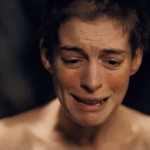 Start with the fact that Les Miz boasts a book so leadfooted it would trip up Fred Astaire. Toss in Tom Hooper’s equally clunky direction. Then cast alto Hathaway without transposing her soprano part in that squeaky-on-a-good-day score. Stir in her generalized histrionics, so over the top that to date she has only seemed naturalistic when playing an actual hysteric in Rachel Getting Married (which you must rent if you’ve not seen it; so terrific). Boil for nearly three hours. The result: Every minute that Hathaway filled the big screen with her squawking voice, that plucked chicken getup and a crysmile so contorted that it made Claire Danes look calm and collected, I gazed wonderingly at all the rapt faces surrounding me in the audience. Did they not know? Did they not see it? Dude, that emperor was naked!
Start with the fact that Les Miz boasts a book so leadfooted it would trip up Fred Astaire. Toss in Tom Hooper’s equally clunky direction. Then cast alto Hathaway without transposing her soprano part in that squeaky-on-a-good-day score. Stir in her generalized histrionics, so over the top that to date she has only seemed naturalistic when playing an actual hysteric in Rachel Getting Married (which you must rent if you’ve not seen it; so terrific). Boil for nearly three hours. The result: Every minute that Hathaway filled the big screen with her squawking voice, that plucked chicken getup and a crysmile so contorted that it made Claire Danes look calm and collected, I gazed wonderingly at all the rapt faces surrounding me in the audience. Did they not know? Did they not see it? Dude, that emperor was naked!
The Unlaudable Lone Wolf Award: Kathryn Bigelow
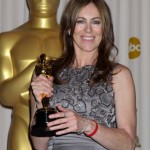 Hollywood–and Ameriker in general–loves a lone-wolf narrative, and from Blue Steel on, that’s been the specialty of Zero Dark 30 director Bigelow, who traffics in stories of a man or, more often, woman pitted against the machine. Whether it’s because she herself is a woman (and a hot one at that!) or because her technique is deemed artful, she encounters a glaring lack of flak for how politically neutral her last two films have been on the most politically unneutral of topics: the US military. Yes, many protested her depiction of torture but not the general amorality of this film, which is at core unfettered by any examination of the greater political issues fueling our conflict with the Middle East. Truly, should we be embracing more stories about war that oversimplify or even ignore bigger questions about the US’s presence and impact internationally? Is it useful or even tolerable to embrace a storytelling technique that can be used to rationalize everything from the NRA to rampant narcissism? And, really, should we be advocating the reduction of the profoundly complex legacy of September 11, 2001 to a bloodless search for Osama Bin Laden? Methinks not.
Hollywood–and Ameriker in general–loves a lone-wolf narrative, and from Blue Steel on, that’s been the specialty of Zero Dark 30 director Bigelow, who traffics in stories of a man or, more often, woman pitted against the machine. Whether it’s because she herself is a woman (and a hot one at that!) or because her technique is deemed artful, she encounters a glaring lack of flak for how politically neutral her last two films have been on the most politically unneutral of topics: the US military. Yes, many protested her depiction of torture but not the general amorality of this film, which is at core unfettered by any examination of the greater political issues fueling our conflict with the Middle East. Truly, should we be embracing more stories about war that oversimplify or even ignore bigger questions about the US’s presence and impact internationally? Is it useful or even tolerable to embrace a storytelling technique that can be used to rationalize everything from the NRA to rampant narcissism? And, really, should we be advocating the reduction of the profoundly complex legacy of September 11, 2001 to a bloodless search for Osama Bin Laden? Methinks not.
The Eat My Words Award: Lincoln
 Spielberg just annoys me. I love his supernatural movies, from Poltergeist to Minority Report, but when he tackles historical subjects no one except for the aforementioned QT rankles more. His sentimentality might’ve proved endearing when ET was phoning home but not so much when he made a feel-good story about the freaking Holocaust. So it goes without saying I was certain I would loathe Lincoln. The story of how a bunch of white guys in one room determined the fate of black people in the United States, directed by Little Mister Red Coat? No, thank you. Bottom line: I was wrong. Whether it was the complex, well-observed script by national treasure Tony Kushner (Angels in America) or the subtly strong performances by the likes of Daniel Day Lewis, Sally Field, Tommy Lee Jones, Hal Holbrook, David Strathairn, John Hawkes, Jackie Earle Haley, Tim Blake Nelson, Adam Driver, and James Spader, this was the timeliest and most stirring cinematic articulation of the American legislative process I have ever witnessed. Granted, it would have been nice for a movie about the emancipation of the slaves to include at least one fully formed black character but at the same time this failing is part of the story: that, all too often, our fates are determined by people who are only faintly concerned with our well-being.
Spielberg just annoys me. I love his supernatural movies, from Poltergeist to Minority Report, but when he tackles historical subjects no one except for the aforementioned QT rankles more. His sentimentality might’ve proved endearing when ET was phoning home but not so much when he made a feel-good story about the freaking Holocaust. So it goes without saying I was certain I would loathe Lincoln. The story of how a bunch of white guys in one room determined the fate of black people in the United States, directed by Little Mister Red Coat? No, thank you. Bottom line: I was wrong. Whether it was the complex, well-observed script by national treasure Tony Kushner (Angels in America) or the subtly strong performances by the likes of Daniel Day Lewis, Sally Field, Tommy Lee Jones, Hal Holbrook, David Strathairn, John Hawkes, Jackie Earle Haley, Tim Blake Nelson, Adam Driver, and James Spader, this was the timeliest and most stirring cinematic articulation of the American legislative process I have ever witnessed. Granted, it would have been nice for a movie about the emancipation of the slaves to include at least one fully formed black character but at the same time this failing is part of the story: that, all too often, our fates are determined by people who are only faintly concerned with our well-being.
The In the Future, Hindsight Will Be 20-20 Award: Looper
 Nobody gives time-travel movies their due, perhaps because they rely upon a logic that by definition evades us since time travel still doesn’t exist (that we know of!). But, much like sci-fi noir Blade Runner, Rian Jones’ stylish innovation about a man dispatched to assassinate his future self will no doubt age even better than many films more lauded in what has been an outstanding year in cinema. And I may or may not know that from first-hand knowledge since I may or may not have traveled back from the future to deliver this missive. (Is your mind properly blown yet?)
Nobody gives time-travel movies their due, perhaps because they rely upon a logic that by definition evades us since time travel still doesn’t exist (that we know of!). But, much like sci-fi noir Blade Runner, Rian Jones’ stylish innovation about a man dispatched to assassinate his future self will no doubt age even better than many films more lauded in what has been an outstanding year in cinema. And I may or may not know that from first-hand knowledge since I may or may not have traveled back from the future to deliver this missive. (Is your mind properly blown yet?)
The Not-an-Official-Endorsement Endorsement: Cloud Atlas
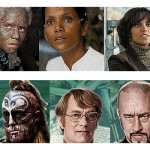 Embarrassing makeup, embarrassing accents (I’m looking at you, Tom Hanks and Hugh Grant), embarrassing dialogue, embarrassing cinematography, super-embarrassing editing: I could not officially recommend Cloud Atlas. But given that it was a time-travel movie about reincarnation and the illusory nature of such constructs as gender, race, and linear time, I loved it to bits. The Wachowski Siblings have a knack for making unfathomably unfathomable topics palatable to general audiences–who but those kids could mainstream a handy term like “the matrix” to describe the brainwash of everyday life?–but they do it at a significant cost to quality. There ain’t nothing wrong with B movies just like there ain’t nothing wrong with what used to be called supermarket novels since they do secure a larger audience. But I wonder how deliberately the Ws make that aesthetic choice: In Cloud they achieved an adaptation of a rewardingly difficult British novel but they also gravitate toward wooden dialogue and wooden players like Halle Berry and Keanu Reeves, bless their souls. Hell, they can even coax wooden performances out of actors as fine as Jim Broadbent. (Perhaps they deserve the anti-Nicolas Cage award?) Hence, this may not be an Official Endorsement—but I freaking loved this film, perhaps all the more for the great fun of its cheesiness.
Embarrassing makeup, embarrassing accents (I’m looking at you, Tom Hanks and Hugh Grant), embarrassing dialogue, embarrassing cinematography, super-embarrassing editing: I could not officially recommend Cloud Atlas. But given that it was a time-travel movie about reincarnation and the illusory nature of such constructs as gender, race, and linear time, I loved it to bits. The Wachowski Siblings have a knack for making unfathomably unfathomable topics palatable to general audiences–who but those kids could mainstream a handy term like “the matrix” to describe the brainwash of everyday life?–but they do it at a significant cost to quality. There ain’t nothing wrong with B movies just like there ain’t nothing wrong with what used to be called supermarket novels since they do secure a larger audience. But I wonder how deliberately the Ws make that aesthetic choice: In Cloud they achieved an adaptation of a rewardingly difficult British novel but they also gravitate toward wooden dialogue and wooden players like Halle Berry and Keanu Reeves, bless their souls. Hell, they can even coax wooden performances out of actors as fine as Jim Broadbent. (Perhaps they deserve the anti-Nicolas Cage award?) Hence, this may not be an Official Endorsement—but I freaking loved this film, perhaps all the more for the great fun of its cheesiness.
The Hometown Honey Award: Boston Kids
 Anybody who knows me knows I am obscenely proud of growing up in Greater Boston, though you couldn’t get me to live there again full-time if you paid me all the chowda in Slummaville. (Give me NYC subways or give me death!) So you could accuse me of just a little bias when I claim the natives of my town as the most talented ones in all the land–or you could just admit that I, like everyone from Boston, am wicked smaht. Here’s a short list of Massholes who crushed it last year: Amy Poehler, Ellen Pompeo, Mark Wahlberg, Ari Graynor, Louis CK, Ben and Casey Affleck, BJ Novak, Ben Foster, John Krasinski, Steve Carrell, Alex Karpovsky, Connie Britton and Matt Do-It Damon. A sad exception is….
Anybody who knows me knows I am obscenely proud of growing up in Greater Boston, though you couldn’t get me to live there again full-time if you paid me all the chowda in Slummaville. (Give me NYC subways or give me death!) So you could accuse me of just a little bias when I claim the natives of my town as the most talented ones in all the land–or you could just admit that I, like everyone from Boston, am wicked smaht. Here’s a short list of Massholes who crushed it last year: Amy Poehler, Ellen Pompeo, Mark Wahlberg, Ari Graynor, Louis CK, Ben and Casey Affleck, BJ Novak, Ben Foster, John Krasinski, Steve Carrell, Alex Karpovsky, Connie Britton and Matt Do-It Damon. A sad exception is….
The Wouldacouldashoulda Award: Mindy Kaling
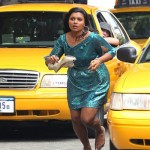 I hotly anticipated Mindy Kaling’s Fox sitcom, and not just because she also hails from the Boston area. Her work both as a performer and writer on The Office consistently slayed me, and I adored her 2011 memoir Is Everyone Hanging Out Without Me? (And Other Concerns). But The Mindy Project, with its singsong nastiness and go-get-it-girl self-loathing, embodies what bums me out about straight girls in general. Oh, Dr. Mindy: watch a few episodes of The Wire and call us in the morning.
I hotly anticipated Mindy Kaling’s Fox sitcom, and not just because she also hails from the Boston area. Her work both as a performer and writer on The Office consistently slayed me, and I adored her 2011 memoir Is Everyone Hanging Out Without Me? (And Other Concerns). But The Mindy Project, with its singsong nastiness and go-get-it-girl self-loathing, embodies what bums me out about straight girls in general. Oh, Dr. Mindy: watch a few episodes of The Wire and call us in the morning.
And while we’re on the subject of wouldacouldashouldas, an honorary mention goes to This Is 40. I love Judd Apatow’s films, especially Funny People, which I thought a brilliantly Cassavetes-like take on modern Hollywood have-it-allitus. But though I’d ignored all negative advance buzz about the comedic director’s latest, I found sitting through it utter hell. All of his strengths mutated into deficits in this oddly paced, tin-eared, overlit, bodily-(dys)functional catalog of purchases and poops. Por favor no más, papi.
The Help Us Obi-Wan, You’re Our Only Hope (for Lady Actors) Award: Jennifer Lawrence and Emma Stone

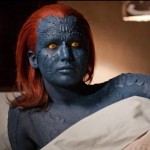 At 22 and 24 respectively, Lawrence and Stone belong to a generation who’s cut its teeth on social media and George W.; who only recognize references to references about the ’60s and phrase every sentence as a question? I may be a middle-aged curmudgeon but I do worry about the extinction of the screwball dame, the silverscreen diva. I love me some Lena but she’s not versatile enough to follow in the footsteps of Barbara Stanwyk and Carole Lombard; Rebel Wilson is best as comic relief; Zosia Mamet and Mae Whitman’s brows are too much to bear in a true Hollywood star; Felicity Jones is too wheedling; and I won’t deign to spear the franchise girls. But fast-talking Stone and powerhouse Lawrence have proven amply they have everything they–and we–need to ensure at least two working actresses will carry that leading lady torch for many years to come.
At 22 and 24 respectively, Lawrence and Stone belong to a generation who’s cut its teeth on social media and George W.; who only recognize references to references about the ’60s and phrase every sentence as a question? I may be a middle-aged curmudgeon but I do worry about the extinction of the screwball dame, the silverscreen diva. I love me some Lena but she’s not versatile enough to follow in the footsteps of Barbara Stanwyk and Carole Lombard; Rebel Wilson is best as comic relief; Zosia Mamet and Mae Whitman’s brows are too much to bear in a true Hollywood star; Felicity Jones is too wheedling; and I won’t deign to spear the franchise girls. But fast-talking Stone and powerhouse Lawrence have proven amply they have everything they–and we–need to ensure at least two working actresses will carry that leading lady torch for many years to come.
The Alec Baldwin Award: Jude Law
 All through the ’80s and early ’90s, Alec Baldwin suffered the indignity of straight-faced leading man roles on account of his searing good looks. More often than not, he flatlined, though in retrospect he was likely straining at the dog collars of those two-dimensional characters. Certainly just around when he lost some of his good looks to age, bloat and booze, he emerged as a tremendous comic performer in everything from the voiceover of The Royal Tannenbaums to his career-defining gig as 30 Rock’s Jack Donaghy. Enter Jude Law, who, with his sadsack eye circles and receding hairline, has finally been liberated from the hegemony of the chronically handsome, where he always seemed vaguely uncomfortable unless he was subverting his beauty as in The Talented Mr. Ripley. In projects ranging from last year’s underrated Contagion to this year’s overrated Anna Karenina, he has found his calling as an ideal character actor.
All through the ’80s and early ’90s, Alec Baldwin suffered the indignity of straight-faced leading man roles on account of his searing good looks. More often than not, he flatlined, though in retrospect he was likely straining at the dog collars of those two-dimensional characters. Certainly just around when he lost some of his good looks to age, bloat and booze, he emerged as a tremendous comic performer in everything from the voiceover of The Royal Tannenbaums to his career-defining gig as 30 Rock’s Jack Donaghy. Enter Jude Law, who, with his sadsack eye circles and receding hairline, has finally been liberated from the hegemony of the chronically handsome, where he always seemed vaguely uncomfortable unless he was subverting his beauty as in The Talented Mr. Ripley. In projects ranging from last year’s underrated Contagion to this year’s overrated Anna Karenina, he has found his calling as an ideal character actor.
The They’re My Boyfriends So Keep Your Meat Hooks to Yourself Award: Jason Segel, Jamie Foxx, Channing Tatum, Taye Diggs
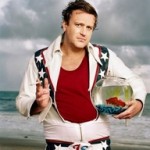


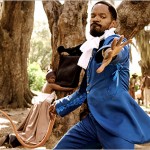
’Nuff said.
The Dubious Honors, like many award ceremonies, may have dragged on for too long, so in closing I’ll just say, remember, folks—(cue a giant hook dragging me off your screen, Muppet Show style.)

